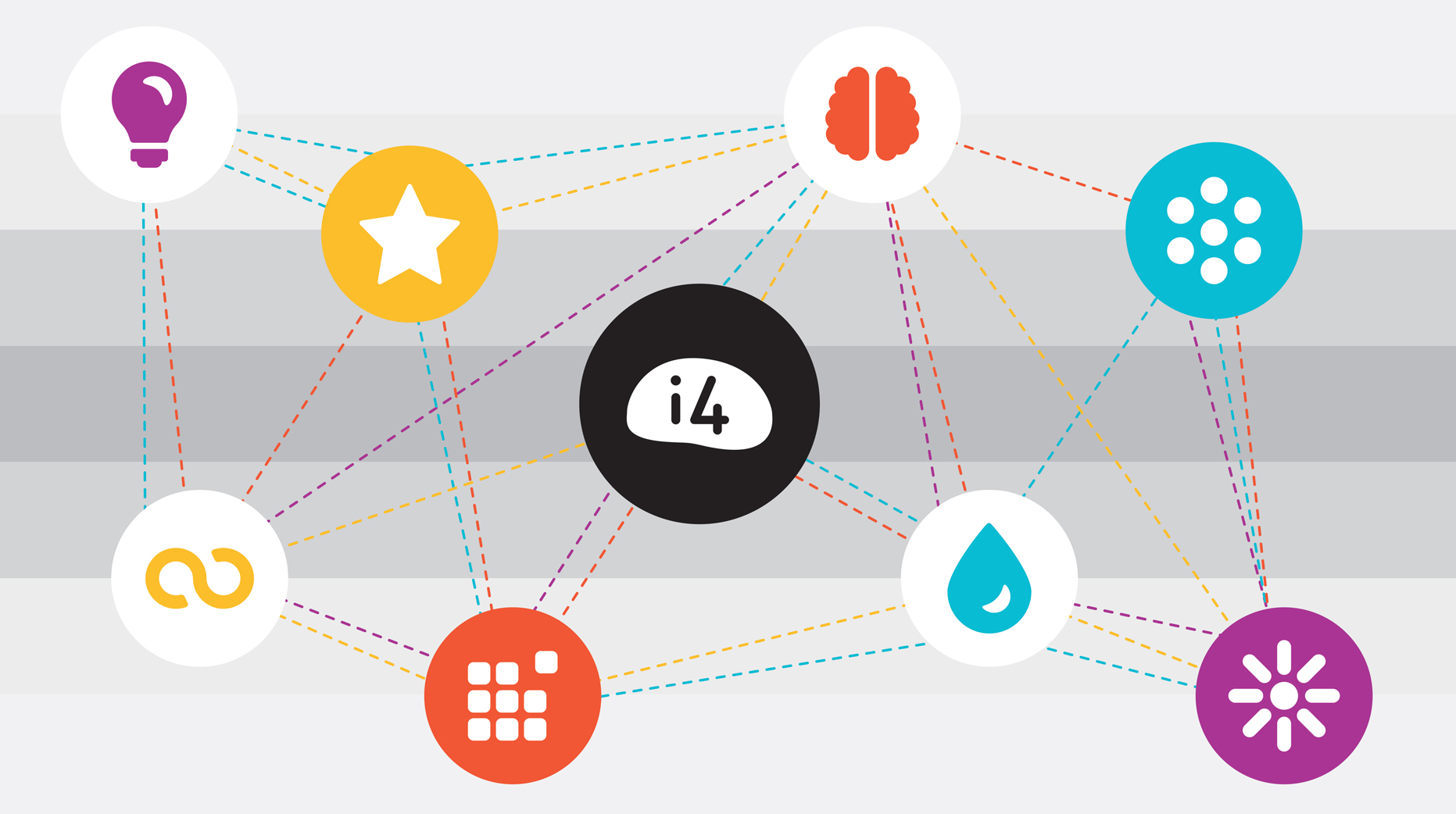The Neurobiology of Imagination - Becoming an Innovative Leader
We live in a time when knowledge is literally at our fingertips. Even very young children know how to navigate Google or YouTube to find cartoons or information that interests them. In a world where nearly everyone can access an unlimited amount of information, how can we learn to stay competitive? The edge that truly innovative leaders and organisations have is imagination.
As defined in the Leadership is Upside Down book, imagination is one of the four main pillars of the i4 Neuroleader Model. We define imagination as the process of mentally forming new concepts, ideas, or patterns without involving the senses. In a world where data is readily available, imagination is the new currency as the economy heavily relies on creative ideas and innovative thoughts.1
Neuroscience Helps Us Understand Imagination In The Brain
Neuroimaging is helping to reveal the secrets of how our imagination works. The concept of taking a break to increase creativity has driven considerable research in the past few decades.
One study found that unrelated thoughts (thinking about something besides what you are doing) can stimulate the creative problem-solving process.2
“Most creative people stumble upon their tool to increase their imaginability, whether it’s taking a bath or a walk or a drink of bourbon.”
Rex Jung, Neuropsychologist
Humans spend about half of their time daydreaming or allowing the mind to wander.3 Scientifically, these are known as stimulus-independent thoughts, meaning your senses aren’t relaying information. A set of brain regions called the default mode network are active during stimulus-free states, but these areas are suppressed when our attention is focused on our surroundings.
Research now suggests that activating the default mode is important for mental processing, including recalling memories, imagining the future, and experiencing social emotions. These associations with brain health support time spent daydreaming and resting the mind.4
The Biggest Buzzword In The Business Is Innovation
It seems there are always buzzwords in business, or words that people like to throw out as if they will magically solve all the problems a corporation faces. In reality, without a true understanding of these buzzwords, the moment passes, and no one tends to learn anything.
Fortunately, it’s exciting to relearn how to use our imagination so we can innovate and come up with new ideas, new products, new services, or imagine ways to improve what we are already doing. Even though many people do not see themselves as imaginative, imagination is happening in their brains, even when they don’t realise it.
Artificial intelligence is also considered a “big thing” on the horizon, but AI and robotic machines, in reality, should be considered tools to help supplement human working conditions. The idea that AI will replace our imaginations is likely never to reach fruition, even though science fiction stories seem to believe so. However, the trillions of connections that make each human brain unique cannot be so easily simplified and merely copied to a machine.
Preparing Your Brain To Imagine In The Future Of Work
Leaders can no longer claim superior knowledge to ensure that others will follow them because the Internet provides a plethora of information ready to be accessed by anyone. Imagination will be what sets individuals and organisations apart, so it’s time to take a hard look and determine if your workplace is conducive to developing imagination.
To stimulate your imagination:
- Learn to relax: Create spaces at work that facilitate relaxation. Comfortable seating, quiet areas, and green spaces (inside or outside) will help you and your employees learn to relax. Develop a culture that welcomes the idea that imagining is not only okay, but it’s desirable.
- Give yourself permission to imagine: Even if you think your thoughts are outlandish or even silly, permit yourself to spend time daydreaming. Some of the most notable people in the world, such as Albert Einstein and Sir Isaac Newton came up with their best ideas when they weren’t actively trying to think of them.
- Look at problems as mental challenges: We all face issues in life. This fact doesn’t mean that we must despair and feel lost. Instead, look at your problems as mental puzzles to solve. When we retrain the brain to seek out positives instead of dwelling on negatives, we will increase our imagination and see new answers to our problems.
Good health and well-being require a healthy, active brain. Neuroimaging has shown that our brains are not idle when our minds wander. Called “the mental workspace”, this area is active across eleven regions of the brain, helping us to manipulate symbols, images, ideas, and theories.
The understanding that the brain is very active while imagining is critical for companies who want to innovate and be at the forefront of their industry.
When leaders value imagination and understand how it works in the brain, they can apply strategies to enhance people’s ideas, which in turn will impact what the team can produce. To learn more about how to activate your imagination, check out our award-winning leadership development programs and educational documentary!
Read Related Article:
The Biggest Buzzword in Business is “Innovation” - Let’s Dig Deeper!
Citations:
- Damiano S, Cubeiro JC, de Haas T. Leadership is Upside Down: The i4 Neuroleader Revolution. About my Brain Institute. 2014.
- Baird B, Smallwood J, Mrazek M, Kam JWY, Franklin MS, Schooler JW. Inspired by Distraction: Mind Wandering Facilitates Creative Incubation. Psychological Science. 2012;12:1117. DOI: 10.1177/0956797612446024
- Poerio GL, Totterdell P, Emerson LM, Miles E. Social Daydreaming and Adjustment: An Experience-Sampling Study of Socio-Emotional Adaptation During a LIfe Transition. Front Psychol. 2016;7:13. DOI: 10.3389/fpsyg.2016.00013
- Immordino-Yang MH, Christodoulou JA, Singh V. Rest in Not Idleness: Implications of the Brain’s Default Mode for Human Development and Education. Perspectives on Psychological Science. 2012;7(4):352-364. DOI: 10.1177.1745691612447308
- i4 Neuroleader (353)
- Leadership & Culture (325)
- Brain Health & Wellbeing (202)
- Innovation (97)
- Performance (85)
- Our News (80)
- Collaboration (68)
- Agility (53)
- Practitioner Stories (44)
- In The Press (36)
- Make Me A Leader (33)
- Balance (31)
- Integration (30)
- Imagination (29)
- Awareness (23)
- Brain-Friendly Channel (22)
- Communication (22)
- Curiosity (21)
- Inspiration (19)
- Intuition (19)
- Attitude (17)
- Courage (16)
- Adaptability (14)
- Case Studies (14)
- Drive (14)
- Generosity (13)
- Brain-Friendly Leadership (11)
- Ethics (9)
- Mental Readiness (9)
- Influence (8)
- Retreat (6)
- Brain-Friendly Leadership (1)
- Oracle Cards (1)
- 1 April 2025 (1)
- 1 March 2025 (9)
- 1 February 2025 (3)
- 1 September 2024 (4)
- 1 July 2024 (2)
- 1 June 2024 (6)
- 1 May 2024 (2)
- 1 April 2024 (3)
- 1 March 2024 (1)
- 1 November 2023 (1)
- 1 August 2023 (1)
- 1 July 2023 (2)
- 1 June 2023 (2)
- 1 May 2023 (4)
- 1 April 2023 (2)
- 1 March 2023 (7)
- 1 February 2023 (4)
- 1 January 2023 (1)
- 1 September 2022 (1)
- 1 May 2022 (3)
- 1 April 2022 (1)
- 1 March 2022 (5)
- 1 February 2022 (4)
- 1 January 2022 (4)
- 1 December 2021 (2)
- 1 November 2021 (4)
- 1 October 2021 (3)
- 1 September 2021 (6)
- 1 August 2021 (1)
- 1 April 2021 (1)
- 1 December 2020 (2)
- 1 November 2020 (1)
- 1 September 2020 (1)
- 1 August 2020 (1)
- 1 July 2020 (3)
- 1 June 2020 (4)
- 1 May 2020 (3)
- 1 April 2020 (4)
- 1 March 2020 (6)
- 1 February 2020 (4)
- 1 January 2020 (2)
- 1 December 2019 (3)
- 1 November 2019 (3)
- 1 October 2019 (5)
- 1 September 2019 (4)
- 1 August 2019 (4)
- 1 July 2019 (4)
- 1 June 2019 (5)
- 1 May 2019 (9)
- 1 April 2019 (9)
- 1 March 2019 (8)
- 1 February 2019 (7)
- 1 January 2019 (8)
- 1 December 2018 (5)
- 1 November 2018 (10)
- 1 October 2018 (16)
- 1 September 2018 (9)
- 1 August 2018 (10)
- 1 July 2018 (9)
- 1 June 2018 (8)
- 1 May 2018 (9)
- 1 April 2018 (9)
- 1 March 2018 (9)
- 1 February 2018 (8)
- 1 January 2018 (8)
- 1 December 2017 (6)
- 1 November 2017 (9)
- 1 October 2017 (9)
- 1 September 2017 (8)
- 1 August 2017 (10)
- 1 July 2017 (8)
- 1 June 2017 (8)
- 1 May 2017 (9)
- 1 April 2017 (8)
- 1 March 2017 (6)
- 1 January 2017 (3)
- 1 December 2016 (4)
- 1 November 2016 (5)
- 1 October 2016 (4)
- 1 September 2016 (2)
- 1 August 2016 (4)
- 1 July 2016 (4)
- 1 June 2016 (2)
- 1 May 2016 (3)
- 1 April 2016 (3)
- 1 March 2016 (7)
- 1 February 2016 (2)
- 1 January 2016 (5)
- 1 December 2015 (2)
- 1 November 2015 (2)
- 1 October 2015 (4)
- 1 September 2015 (2)
- 1 August 2015 (2)
- 1 July 2015 (1)
- 1 June 2015 (3)
- 1 May 2015 (4)
- 1 April 2015 (5)
- 1 March 2015 (3)
- 1 February 2015 (3)
- 1 January 2015 (3)
- 1 December 2014 (3)
- 1 November 2014 (3)
- 1 October 2014 (3)
- 1 September 2014 (5)
- 1 August 2014 (4)
- 1 July 2014 (5)
- 1 June 2014 (3)
- 1 May 2014 (1)
- 1 March 2014 (1)
- 1 December 2013 (2)
- 1 November 2013 (1)
- 1 July 2013 (1)
- 1 June 2013 (1)
- 1 May 2013 (3)
- 1 April 2013 (1)
- 1 March 2013 (2)
- 1 February 2013 (1)
- 1 January 2013 (2)
- 1 November 2012 (1)
- 1 October 2012 (1)
- 1 September 2012 (1)
- 1 August 2012 (2)
- 1 July 2012 (1)
- 1 June 2012 (1)
- 1 May 2012 (2)
- 1 April 2012 (1)
- 1 February 2012 (1)
- 1 January 2012 (1)
- 1 November 2011 (1)
- 1 October 2011 (3)
- 1 September 2011 (2)
- 1 July 2011 (1)
- 1 June 2011 (1)
- 1 May 2011 (1)
- 1 April 2011 (1)
- 1 March 2011 (1)
- 1 February 2011 (2)
- 1 January 2011 (4)
- 1 December 2010 (4)
- 1 November 2010 (3)
- 1 October 2010 (5)
- 1 September 2010 (4)
- 1 August 2010 (4)
- 1 July 2010 (3)
- 1 June 2010 (4)
- 1 May 2010 (7)
- 1 April 2010 (5)
Subscribe by email
You May Also Like
These Related Stories

The Neurobiology of Performance: Applying Brain-Friendly Practices in Coaching & Wellbeing Training

Rediscover A Healthier Self With The i4 Neuroleader Methodology




No Comments Yet
Let us know what you think